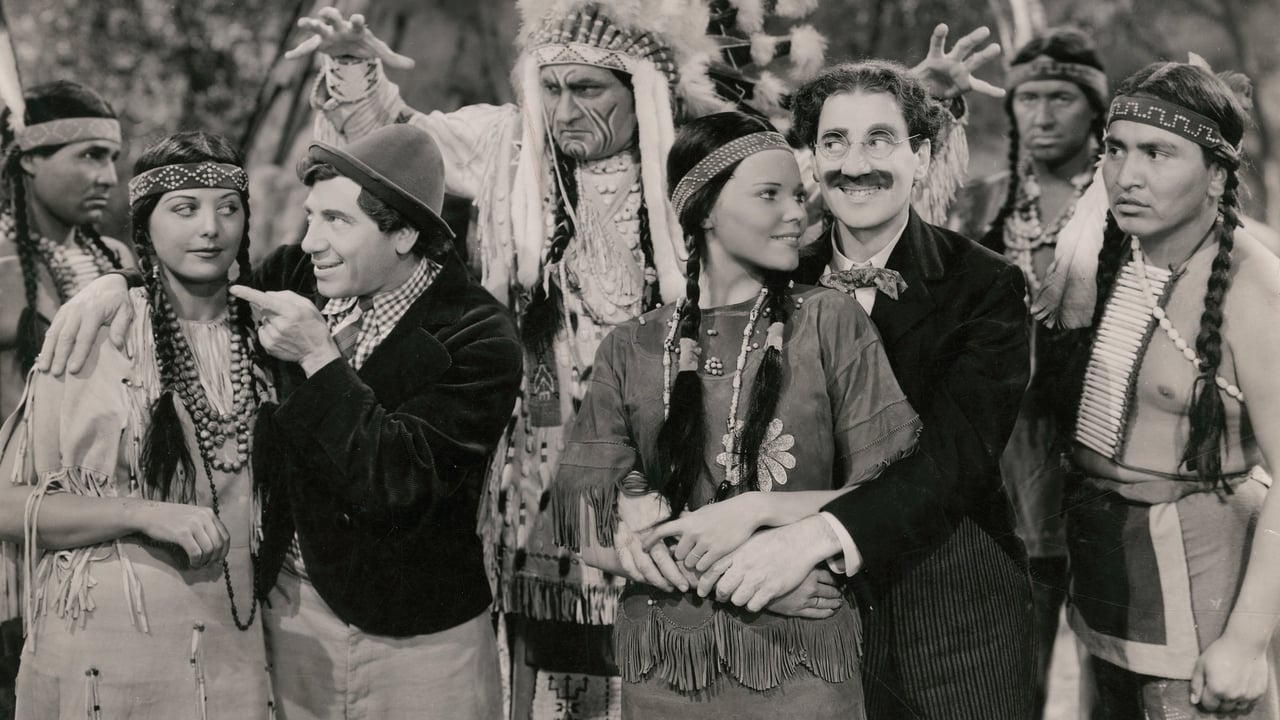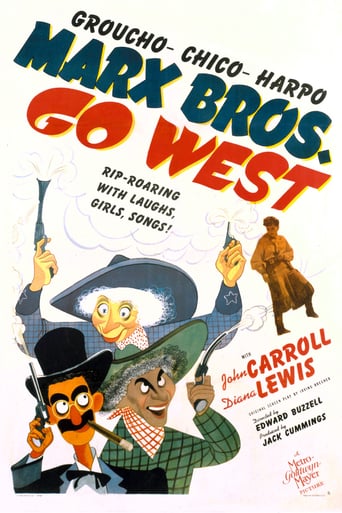Develiker
terrible... so disappointed.
Protraph
Lack of good storyline.
Konterr
Brilliant and touching
Aneesa Wardle
The story, direction, characters, and writing/dialogue is akin to taking a tranquilizer shot to the neck, but everything else was so well done.
robert-temple-1
'I was going to thrash them within an inch of their lives, but I didn't have a tape measure.' (Groucho) This is another hilarious Marx Brothers picture, starring the three, not the four, brothers. It followed AT THE CIRCUS of the previous year (1939). Both films were directed by Edward Buzzell and written by Irving Brecher. It is interesting that Buzzell directed one Thin Man film (SONG OF THE THIN MAN, 1947), and Brecher wrote another (SHADOW OF THE THIN MAN, 1941, his next film after this Marx Brothers one). Brecher is best known however for writing the famous film MEET ME IN ST. LOUIS (1944). In this film, the Marx Brothers truly go wild. They destroy an entire train, a saloon, various rooms, and cause utter mayhem. But then they are in 'the Wild West', aren't they? There are plenty of gags, as usual. At one point, two engine drivers of a train are tied up and gagged by the Marx Brothers. Groucho goes up to one of them, removes the gag from his mouth and then puts it back, and says to the camera: 'This is the best gag in the whole film.' Sitting in a stagecoach with a woman and a baby, Groucho says 'We need to get to the bottom of this,' and touches the baby's bottom. The stage coach is going over many bumps, so the woman complains that she doesn't like the jerks in the coach. On cue, Harpo and Chico get up, open the door and are about to jump out, when Groucho says: 'Not you two,' and pulls them back to their seats. The film opens with a lengthy stand-up confrontation between the three brothers in a railway station. Harpo, wishing to steal money from Groucho's pocket but unable to get his hand into it, produces some scissors and cuts away the side of Groucho's trousers, snips open the bottom of his pocket, and takes the money. Groucho drolly comments: 'It getting rather cool in here,' as we see his bare leg. There is one gag after another. Harpo gets to play the harmonica and then a harp disguised as an Indian weaving frame (an Indian chief in full feather headdress accompanies him on a flute), and Chico plays the piano in a saloon, adding a new touch by knocking on the wood of the piano for some rhythm at one point, and grabbing an apple from Harpo's hands which he was just about to eat, rubbing it along the keyboard to produce some more music. Groucho strums on a guitar and seems to know how to play it. He also sings wonderfully dotty nonsense. But most of the action is riotous anarchy, wanton destruction, and hilarious and outrageous insults to stern and threatening crooks, tomfoolery, and chaos. But as we now know from modern science, chaos conceals hidden structure. If only the kind of humour practiced by the Marx Brothers could still be done today. But no one seems to have a sense of humour anymore. Those of us who still know how to laugh, however, can always watch the Marx Brothers, and escape the horrors of the news. When the apostles of political correctness, and the thought monitors, start destroying film comedies in the interest of 'keeping us safe', let us hope that Groucho, Harpo and Chico find some way to outwit them. Wouldn't it be nice if we could find a way for all the stern and humourless people to laugh themselves to death? What if we tied the men who pulled the man off the plane the other day into chairs and forced them to watch this film? Or are such people entirely impervious to jokes? In life, I hold to the view that the only thing that is not a joke is the people who cannot get a joke, and who have never laughed in their lives. As a certain president might say in a tweet: 'Sad.'
SnoopyStyle
S. Quentin Quale (Groucho Marx) is a con-man heading west. He encounters seemingly bumbling brothers Joseph (Chico Marx) and Rusty Panello (Harpo Marx) in a train station and ends up losing his money to them. The brothers meet old miner Dan Wilson who hasn't found gold for 40 years on his property, Dead Man's Gulch. They lend him $10 and get the property as collateral. Meanwhile, Terry Turner arranges the sale of the property to the railroad for $50k. The Turners and Wilsons are rivals. Terry hopes to ease the rivalry with the sale and marry Dan's granddaughter Eve Wilson. Saloon owner Red Baxter receives a telegram to get the property. The boys write an IOU on the back of the deed to pay for beer at Red's saloon.This is full of the Marx brothers antics. Chico plays the piano. Groucho is the heel. Harpo doesn't talk and finds an usual harp with the Indians. This comes after a string of iconic Marx brothers comedy hits. These things come in cycles and the guys may be wearing out their welcome. They haven't changed their verbal gags and there are still songs. The last act is all action on a train and that's plenty of fun. For Marx fans, this should still hit the spot.
mike48128
I hadn't seen this one in a decade, and I forgot how great the ending was! Yes, it has the usual devices: Snappy dialogues, bad musical numbers, piano and harp solos, and tons of terrific satire, making fun of every "Western Movie" you have ever seen, drama or comedy. It especially "thumbs its nose" at the "big duel" so common it's a cliché. What sets it apart is the 12-minute-long but well-produced "climax chase ending" to sign over the deed to the barren "Gold Mine" which the railroad needs to buy for "the right of way" through it. Of course the Marx Bros. make the "pistol-packing" villains look like bumbling idiots. Harpo dumps all the wood in the trains' tinder box, then discovers that the train must continue to its destination after all. The "bad guys" are racing alongside the train in a horse-drawn buckboard. He totally "cannibalizes" the entire wooden-structure of the speeding steam locomotive, including all the cars, freight and luggage on board. Yes, this has been done before and since. (Remember the riverboat in "Around to World in 80 days, in 1955?) However, never has it been more effective and funnier than here, over 15 years earlier!
Harold
It was with fairly low expectations that I popped "Go West" into my DVD player this evening. After all, as Marx Bros. purists repeat ad nauseam, the Brothers' later pictures generally failed to live up to the high standards set by their earlier Paramount-era films. That may be so, but I found "Go West" to be hilarious all the same. Which is hardly surprising since nobody does mayhem like the Marx Bros.! As always, Groucho has lots of great one-liners, Chico plays a charming con-man, and Harpo gets up to all kinds of anarchic antics. Encountering Groucho for the first time in the train station, Chico asks where the train is. Groucho replies, "It's out on the tracks; it seldom comes in here." In previous films, the Brothers' made fun of the circus and the opera; in this film, they play havoc with the conventions of the Old West. On observing a fatal shooting outside a saloon, Chico tells Harpo: "I don't like-a the West: all the people do is kill each other. I'd like-a the West better if it was in the East."In contrast to some of their other films, especially "At the Circus," the musical numbers are delightful and catchy. That goes not only for the solos by Chico and Harpo, but also for the duets sung by the star-crossed lovers. This latter feature of the MGM films was often tedious and forgettable; happily, that is not the case in "Go West." I thoroughly enjoyed this film and would recommend it to anyone who appreciates the madcap humour of the Marx Bros. The climactic train sequence alone makes the film a must-see.

